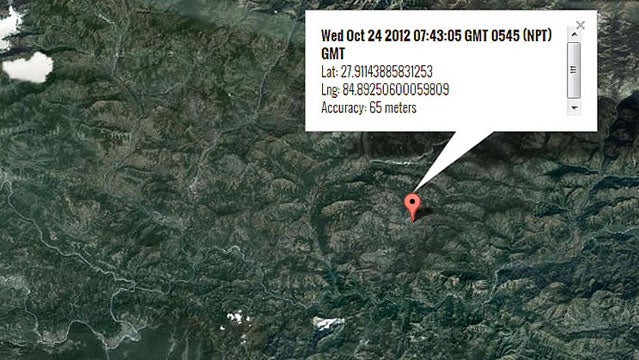When preparing for emergencies, sticking to the golden rule—never leave for a trip without letting ‘em know where and how long—beats any cell phone, GPS, emergency beacon, or flare gun. But for most, it’s a last-minute effort, usually amounting to a note scrawled, “DEB—THE CRAG, BACK TUES.”
Several web services and phone apps now make it much easier to provide search-and-rescue parties your vital details. One new entry is , for iPhone, which launched two months ago, and caters to hikers as well as runners, people on blind dates, and serious partiers. The free Bugle app texts and emails friends and family when you haven’t returned home when you told the app you would.
We were more curious about , a service geared specifically to outdoor adventures. To test it, we paid the $4.99 yearly fee, and then filled out an exhaustive questionnaire including our height, weight, medical issues, vehicles, dogs, and favorite hiking spots. We punched in the cell phone numbers and email addresses of our loved ones.
Then, when we staged a mock hiking emergency, we were pleasantly surprised at the smooth process. The service texted our phone asking us if we were back at the appointed time, but we ignored it. Then, an hour later, it texted our contacts, telling them there was a potential emergency and to check their email. There, they saw all the crucial information they would need to hand authorities. They also got the correct local numbers for the sheriff’s department and other authorities in the location of our hike.
It’s a great service and desperately needed—but we still had questions. At first glance, the site seems overly ambitious, mixed with a graphic design still stuck in beta. And as we started giving the site a ton of personal information we began to wonder what kind of company was behind it.
So we talked with founder David Diaz, a 43-year-old former EMT and outdoor-retail-dog turned outdoor-tech-entrepreneur. Diaz has shaped the idea for years, and since its launch in 2012, he runs it with a small staff of marketers and programmers in Santa Fe, New Mexico.
GEAR GUY: I felt a little leery about typing so much personal information into the site, including what gear I owned, my vehicles, and my address. It made me think I was creating a marketing database.
HIKERALERT: That’s something that we had to work into terms of service, but at this point we don’t plan to do any direct marketing or any non-anonymous use of the data. At this point, we use it purely to improve the product itself.
Have you had any big saves yet? Any problems?
Nothing in terms of significant rescues, but HikerAlert has shown some weaknesses. The biggest hurdle with technology that we found was the geolocation [a feature where you can leave breadcrumbs with your smart phone]. There are so many factors that can sometimes make GPS on cell phones inaccurate, we’re considering removing it.
Why should someone register with HikerAlert instead of just buying at personal locator beacon�����Բ��ٱ�?
The casual hiker won’t buy a $200 to $300 device. And even if they did, how effective is a personal locator beacon in comparison with the basic practice of leaving good information behind. Think about Aron Ralston’s story. A PLB probably wouldn’t have helped him out because of the canyon’s depth. Maybe HikerAlert would have been a better tool. Maybe it would have cut down his 127 hours considerably.
By using the service you can find people of the same level to team up with on trips. But to register as your hiking partner, the other person has to pay.
Yes, everyone on the service needs to pay, but you also get benefits, especially in a group. If there are six of you, only one person has to create a trip report. Just click off the names of the rest of the team. All your friends, and their cars, their dogs, and their contact information all get imported into the trip instantly.


